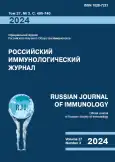Single nucleotide polymorphism of IL-17F as a possible biomarker of rheumatoid arthritis in the Russian population of the Chelyabinsk Region and its non-equilium linkage with IL-17A
- Authors: Shmelkova D.M.1, Stashkevich D.S.1, Suslova T.A.1,2, Devald I.V.1,3
-
Affiliations:
- Chelyabinsk State University
- Chelyabinsk Regional Blood Transfusion Station
- South Ural State Medical University
- Issue: Vol 27, No 3 (2024)
- Pages: 523-530
- Section: SHORT COMMUNICATIONS
- URL: https://bakhtiniada.ru/1028-7221/article/view/267519
- DOI: https://doi.org/10.46235/1028-7221-16775-SNP
- ID: 267519
Cite item
Full Text
Abstract
The interleukin 17 (IL-17) family and its role in the immune response and various pathologies is studied in different research. IL-17A and IL-17F belong to proinflammatory cytokines and are the most studied members of the interleukin 17 family and have similar functions and the greatest activity. They play a key role in the immune response in autoimmune diseases, including rheumatoid arthritis. The key point in the regulation of the amount and functional activity of cytokines, including IL-17A and IL-17F, is polymorphism of their genes. Due to the fact that the polymorphism of the IL-17F gene 7488 T/C is located on chromosome 6 near the polymorphism of the IL-17A gene -197G/A and they both take part in the immunopathogenesis of RA, it is possible that their allelic variants are inherited linked and form haplotypes. The purpose of our study is to identify a possible association of IL-17F gene polymorphism with a predisposition to rheumatoid arthritis, including depending on the age and gender of patients in the Russian population of the Chelyabinsk region, as well as to assess the formation of IL-17A ~ IL-17F haplotypes in a group of patients in comparison with a group of conditionally healthy individuals. The result of our study reliably indicates that the homozygous genotype for the ancestral allele 7488 TT of the IL-17F gene (p << 0.001) makes a huge contribution to the susceptibility to rheumatoid arthritis, including in the group of men. In addition, polymorphisms in the IL-17A and IL-17F genes are linked to each other and form two haplotypes. One of them, IL-17A -197*G ~ IL-17F 7488*C, is associated with a reduced risk of developing rheumatoid arthritis. This haplotype is formed by the ancestral allele of the IL-17A gene and the mutant allele of the IL-17F gene, which takes over the main function and reduces the protein activity level and probably thereby reduces the risk of developing RA.
Full Text
##article.viewOnOriginalSite##About the authors
D. M. Shmelkova
Chelyabinsk State University
Email: stashkevich_dary@mail.ru
Assistant Professor, Department of Microbiology, Immunology and General Biology
Russian Federation, ChelyabinskD. S. Stashkevich
Chelyabinsk State University
Author for correspondence.
Email: stashkevich_dary@mail.ru
PhD (Biology), Associate Professor, Dean, Faculty of Biology
Russian Federation, ChelyabinskT. A. Suslova
Chelyabinsk State University; Chelyabinsk Regional Blood Transfusion Station
Email: stashkevich_dary@mail.ru
PhD (Medicine), Associate Professor, Department of Microbiology, Immunology and General Biology, Head, Department of Molecular Biological Diagnostics
Russian Federation, Chelyabinsk; ChelyabinskI. V. Devald
Chelyabinsk State University; South Ural State Medical University
Email: stashkevich_dary@mail.ru
PhD (Medicine), Associate Professor, Rheumatologist, Department of Microbiology, Immunology and General Biology, Associate Professor, Department of Therapy
Russian Federation, Chelyabinsk; ChelyabinskReferences
- Симбирцев А.С. Цитокины в патогенезе и лечении заболеваний человека : монография. СПб.: Фолиант, 2018. 512 с. [Simbirtsev A.S. Cytokines in the pathogenesis and treatment of human diseases : a monograph]. St. Petersburg: Foliant, 2018. 512 p.
- Сташкевич Д.С., Девальд И.В., Хромова Е.Б., Евдокимов А.В., Суслова Т.А. Полиморфизм гена интерлейкина 17А у больных ревматоидным артритом // Российский иммунологический журнал, 2020. Т. 23, № 3. С. 285-290. [Stashkevich D.S., Devald I.V., Khromova E.B., Evdokimov A.V., Suslova T.A. Polymorphism of the interleukin 17A gene in patients with rheumatoid arthritis. Rossiyskiy immunologicheskiy zhurnal = Russian Journal of Immunology, 2020, Vol. 23, no. 3, pp. 285-290. (In Russ.)] doi: 10.46235/1028-7221-382-IGP.
- Bogunia-Kubik K., Świerkot J., Malak A., Wysoczańska B., Nowak B., Białowąs K., Gębura K., Korman L., Wiland P. IL-17A, IL-17F and IL-23R Gene Polymorphisms in Polish Patients with Rheumatoid Arthritis. Arch. Immunol. Ther. Exp. (Warsz), 2015, Vol. 63, no. 3, pp. 215-221.
- Arlequin ver 3.5 [Электронный ресурс] / Интегрированное программное обеспечение для анализа популяционно-генетических данных / авт. Excoffier, L. 2005. Режим доступа: http://cmpg.unibe.ch/software/arlequin35/. Arlequin ver 3.5 [Electronic resource] / Integrated software for the analysis of population genetic data / author. Excoffier, L. 2005. Access mode: http://cmpg.unibe.ch/software/arlequin35/.
- Gaffen S.L. Structure and signalling in the IL-17receptor family. Nat. Rev. Immunol., 2009, Vol. 9, pp. 556-567.
- Gomes da Silva I.I.F., Angelo H.D., Rushansky E., Mariano M.H., Maia M. de M.D., Eleuterio de Souza P.R. Interleukin (IL)-23 receptor, IL-17A and IL-17F gene polymorphisms in Brazilian patients with rheumatoid arthritis. Arch. immunol. Ther. Exp. (Warsz), 2017, Vol. 65, pp. 537-543.
- He, Y., Du Y., Wei S., Shi J., Mei Z., Qian L., Chen Z., Jie Z. IL-17A and IL-17F single nucleotide polymorphisms associated with lung cancer in Chinese population. Clin. Respir. J., 2017, Vol. 11, pp. 230-242.
- Jahan T., Saleh A.A., Anwar S. Association of Cytokine IL-17, IL-4, IL-6, and IL-12 Gene Polymorphisms in Rheumatoid Arthritis Patients in a Tertiary Care Hospital in Bangladesh. Int. J. Rheumatol., 2024, Vol. 2024, 3728179. doi: 10.1155/2024/3728179.
- Kawaguchi M., Takahashi D., Hizawa N., Suzuki S., Matsukura S., Kokubu F., Maeda Y., Fukui Y., Konno S., Huang S.-K., Nishimura M., Adachi M. IL-17F sequence variant (His161Arg) is associated with protection against asthma and antagonizes wild-type IL-17F activity. J Allergy Clin. Immunol., 2006, Vol. 117, pp. 795-801.
- Pawlik A., Kotrych D., Malinowski D., Dziedziejko V., Czerewaty M., Safranow K. IL17A and IL17F gene polymorphisms in patients with rheumatoid arthritis. BMC Musculoskelet. Disord., 2016, Vol. 17, 208. doi: 10.1186/s12891-016-1064-1.
- Tang H., Pei H., Xia Q., Tang Y., Huang J., Pei F. Role of gene polymorphisms/haplotypes and serum levels of interleukin-17A in susceptibility to viral myocarditis. Exp. Mol. Pathol., 2018, Vol. 104, no. 2, pp. 140-145.
Supplementary files







